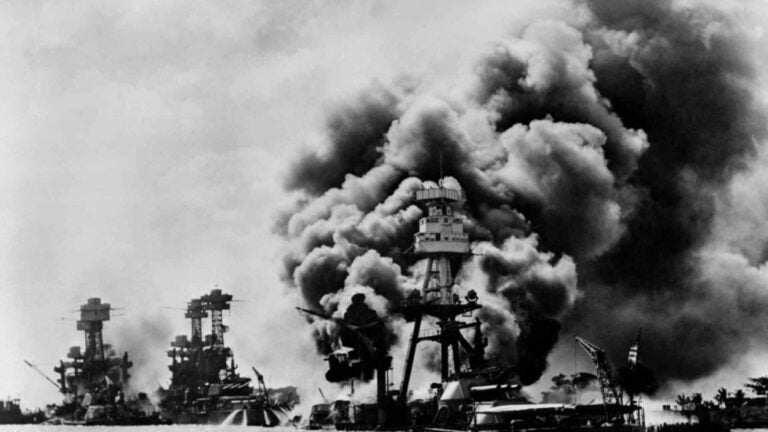
U.S. Navy ships burn in Pearl Harbor following the Japanese attack on Dec. 7, 1941. (Photo/Wikimedia Commons)
75 years later, what is the legacy of Pearl Harbor?
USC experts in international relations, history and American studies and ethnicity find that some lessons stemming from the ‘Day of Infamy’ still apply
Few moments in history made a stronger global impact than the Japanese attack on Pearl Harbor, Hawaii, on Dec. 7, 1941. Drawing the U.S. into war against Japan, the assault also led to America’s open involvement in the European theater, elevating the globe’s conflicts to that of world war.
As we observe Pearl Harbor Remembrance Day and the 75th anniversary of the “date which will live in infamy,” USC Dornsife College of Letters, Arts and Sciences faculty members draw on the lessons of that day to understand how the attack influenced society, finding strong parallels to events unfolding in the U.S. in recent months.
WILLIAM DEVERELL, professor of history and director of the Huntington-USC Institute on California and the West, describes Southern California’s reaction at the time to the attack:
“It had a huge effect on Southern California. For the first time, at least for the first time in the 20th century, coastal California seemed vulnerable to attacks coming from the west or from within. Fear and anger and paranoia wrapped around one another, as conspiracies were imagined, thought up, rumored and spread around. The coast militarized in all kinds of military and civil defense ways.
“And, most glaringly and tragically, Southern California, which was home to tens of thousands of people of Japanese descent, was at the epicenter of the internment orders and process. These people, most of whom were Americans, were sent away to camps in the interior West and South, despite no evidence of any threat whatsoever.”
LON KURASHIGE, professor of history and spatial sciences, notes that relations between the U.S. and Japan are immeasurably better. But he fears we are in danger of repeating mistakes that led to the internments:
“U.S.-Japan relations returned to being quite close — and symbolically closer with President Obama’s recent visit to Hiroshima and now [Japanese] Prime Minister Abe’s declared trip to Pearl Harbor. But we on the planet are still torn apart by war, arms buildup and international conflict.
“War is still very much a part of human existence. More specifically, Americans have failed to learn that minority peoples and religions should not be automatically mistrusted. Japanese Americans back then were automatically mistrusted as an enemy race upholding non-Christian religions. Now the same is true for Muslim Americans today.”
NAYAN SHAH, professor of American studies and ethnicity and history, echoes Kurashige’s concern over repeating past mistakes:
“Remembering Dec. 7, 1941, has renewed significance. It has a deeply troubling legacy as the justification of the race-based mass imprisonment of Japanese-American citizens and residents on the West Coast, among them dozens of USC students and alumni.
“Disregarding decades of historical scholarship, legislation and legal rulings, President-elect Trump and members of his transition team are proposing a registry of Muslim immigrants and Muslim Americans and justifying its legality with the precedent of Japanese and Japanese Americans’ internment. It’s vital we reckon with tragedies and injustice in U.S. history, and learn from grave errors that harmed our democracy and destroyed peoples’ lives.”
SAORI KATADA, associate professor of international relations, takes a different tack, noting that the postwar progress exhibited by the U.S. and Japan is exemplary of how once-embattled nations can look past their differences and find lasting peace and prosperity:
“I feel a kind of awe that the two countries that were once in such hostility have for the last 70 years been the strongest of allies. With efforts on both sides of the Pacific, ties between the United States and Japan have expanded so much and so densely that, I hope, they will sustain the peace between the two countries for the foreseeable future.”
